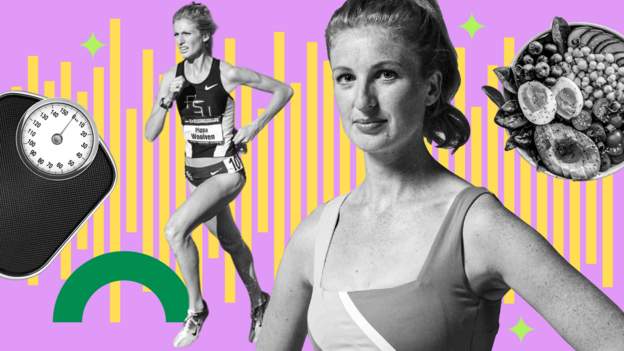Pippa Woolven knew something was wrong.
On an athletics scholarship in the United States, she was supposed to be pursuing her dream. Instead, Woolven was fatigued, had low moods and her performance was going downhill.
She knew something was wrong, but it took years to find out what.
Woolven was suffering from Relative Energy Deficiency in Sport. Known as Red-S, the condition occurs when athletes expend more energy in training than they consume through food and drink.
“I was suffering for around five years of my athletics career,” long-distance runner Woolven, 29, told Women’s Sport Matters – a Sports Desk podcast special produced with the Open University.
“I really struggled to get the diagnosis that I needed [for] years and years. As a consequence, I wound further and further into this energy deficit, developed all sorts of health consequences.”
What is Red-S?
Several other sportswomen have spoken about their experience with Red-S, including athletes Anna Boniface and Bobby Clay, and mountain bike racer Evie Richards.
The condition affects both men and women, and can impact levels of oestrogen – an essential hormone for bone health. As a result of the condition, both Boniface and Clay developed osteoporosis.
The impact on oestrogen means losing your period can be a warning sign of Red-S. Unfortunately for Woolven, all of the doctors she saw thought it was normal for an athlete training at her level.
On top of that, she was using the contraceptive pill, which gives women a bleed that is not technically a period as it happens purely because of hormone changes brought about synthetically.
Woolven, who represented England at the 2014 Commonwealth Games, says doctors “just encouraged me to keep taking it [the pill] in this false sense of security that it provided of having a real, natural period”.
She adds training “should never come at the cost of losing or impacting your menstrual cycle in any way”.
Damaging idea that ‘thinner is faster’
It took years for Woolven’s menstrual cycle to recover, but the psychological effects of Red-S were challenging too.
She says she bought into “the belief system that thinner is faster”, adding: “You have to work for a long time to reverse those mindsets that can become so damaging.
“We’re all led to believe in sport that hard work equals reward, but if that is not balanced with adequate rest, recovery and nutrition, you will never reach your potential.”
Open University sport and fitness professor Simon Rea points out that coaches can “lack control” in this situation because “they don’t really have control over what food is going in before or after training”.
“There is this idea that light is best,” Rea adds.
“The lighter they are, the better their performance is going to be. Unfortunately it works for a while as well.
“They lose weight and they become better but then everything starts crashing down when there is not enough oestrogen available and the bones become brittle.”
Rea believes coaches can play their part.
“You can talk to the athlete about what they had to fuel up for the training and what they are going to have to fuel up afterwards,” he says.
“If we can open up these conversations and have environments where athletes and coaches can have respect for each other, then these conversations can happen.”
Woolven has founded Project RED-S – an organisation that works to increase awareness and prevention and support athletes in their recovery.
Its website highlights some of the key warning signs: unexplained fatigue; recurrent injuries or illness; performance decline; irregular or missing periods; irritability and anxiety around food or weight gain.
Woolven adds some parting advice: “Try and zoom out and look at the bigger picture. Look at your performance over the course of five, 10, however many years you want to be enjoying sport for, and not just the short-term success.”
If you, or someone you know, have been affected by any issues raised in this article, support and information is available at BBC Action Line.
Sports Desk: Women’s Sport Matters is a special mini-series produced in partnership with the Open University. The four episodes cover periods; sportswear; the psychology of injuries and exercise habits. You can listen to them here.

